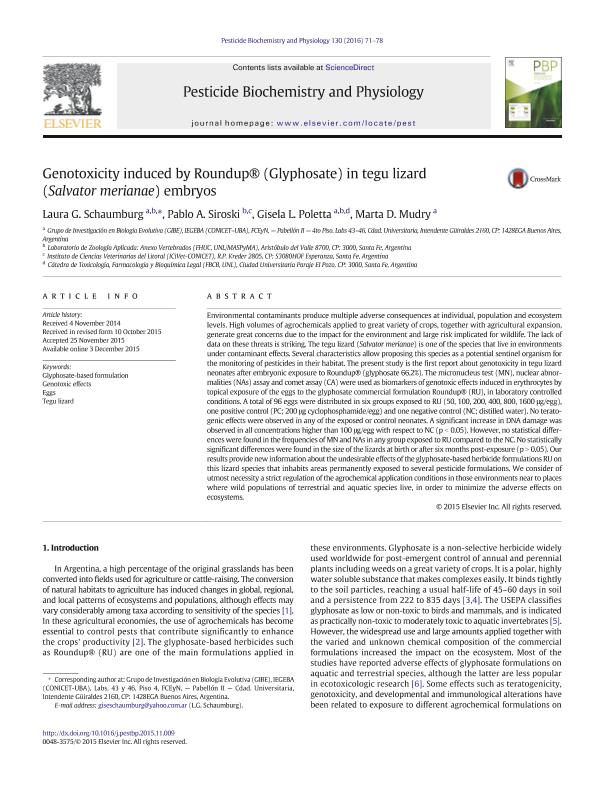Artículo
Genotoxicity induced by Roundup® (Glyphosate) in tegu lizard (Salvator merianae) embryos
Fecha de publicación:
06/2016
Editorial:
Academic Press Inc Elsevier Science
Revista:
Pesticide Biochemistry And Physiology
ISSN:
0048-3575
Idioma:
Inglés
Tipo de recurso:
Artículo publicado
Clasificación temática:
Resumen
Environmental contaminants produce multiple adverse consequences at individual, population and ecosystem levels. High volumes of agrochemicals applied to great variety of crops, together with agricultural expansion, generate great concerns due to the impact for the environment and large risk implicated for wildlife. The lack of data on these threats is striking. The tegu lizard (Salvator merianae) is one of the species that live in environments under contaminant effects. Several characteristics allow proposing this species as a potential sentinel organism for the monitoring of pesticides in their habitat. The present study is the first report about genotoxicity in tegu lizard neonates after embryonic exposure to Roundup® (glyphosate 66.2%). The micronucleus test (MN), nuclear abnormalities (NAs) assay and comet assay (CA) were used as biomarkers of genotoxic effects induced in erythrocytes by topical exposure of the eggs to the glyphosate commercial formulation Roundup® (RU), in laboratory controlled conditions. A total of 96 eggs were distributed in six groups exposed to RU (50, 100, 200, 400, 800, 1600 μg/egg), one positive control (PC; 200 μg cyclophosphamide/egg) and one negative control (NC; distilled water). No teratogenic effects were observed in any of the exposed or control neonates. A significant increase in DNA damage was observed in all concentrations higher than 100 μg/egg with respect to NC (p < 0.05). However, no statistical differences were found in the frequencies of MN and NAs in any group exposed to RU compared to the NC. No statistically significant differences were found in the size of the lizards at birth or after six months post-exposure (p > 0.05). Our results provide new information about the undesirable effects of the glyphosate-based herbicide formulations RU on this lizard species that inhabits areas permanently exposed to several pesticide formulations. We consider of utmost necessity a strict regulation of the agrochemical application conditions in those environments near to places where wild populations of terrestrial and aquatic species live, in order to minimize the adverse effects on ecosystems.
Palabras clave:
EGGS
,
GENOTOXIC EFFECTS
,
GLYPHOSATE-BASED FORMULATION
,
TEGU LIZARD
Archivos asociados
Licencia
Identificadores
Colecciones
Articulos(IEGEBA)
Articulos de INSTITUTO DE ECOLOGIA, GENETICA Y EVOLUCION DE BS. AS
Articulos de INSTITUTO DE ECOLOGIA, GENETICA Y EVOLUCION DE BS. AS
Citación
Schaumburg, Laura Gisela; Siroski, Pablo Ariel; Poletta, Gisela Laura; Mudry, Marta Dolores; Genotoxicity induced by Roundup® (Glyphosate) in tegu lizard (Salvator merianae) embryos; Academic Press Inc Elsevier Science; Pesticide Biochemistry And Physiology; 130; 6-2016; 71-78
Compartir
Altmétricas




